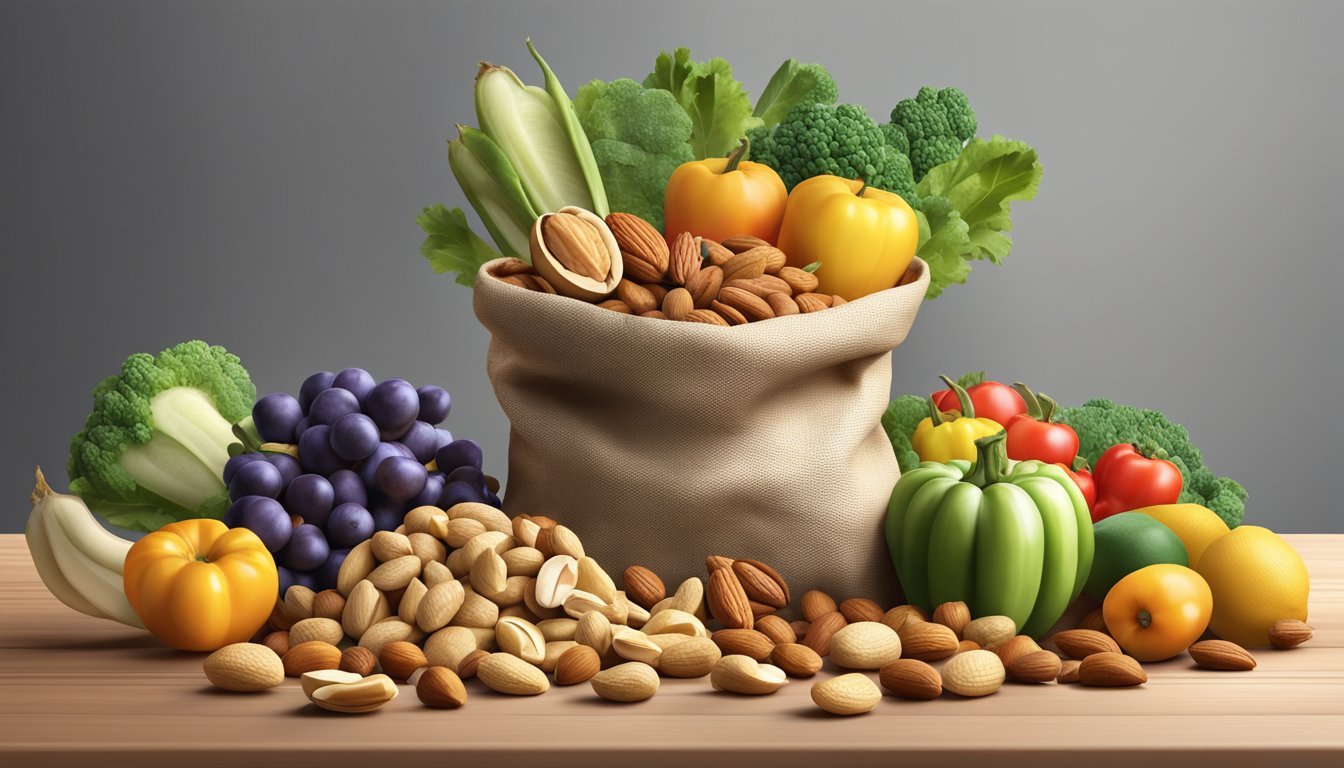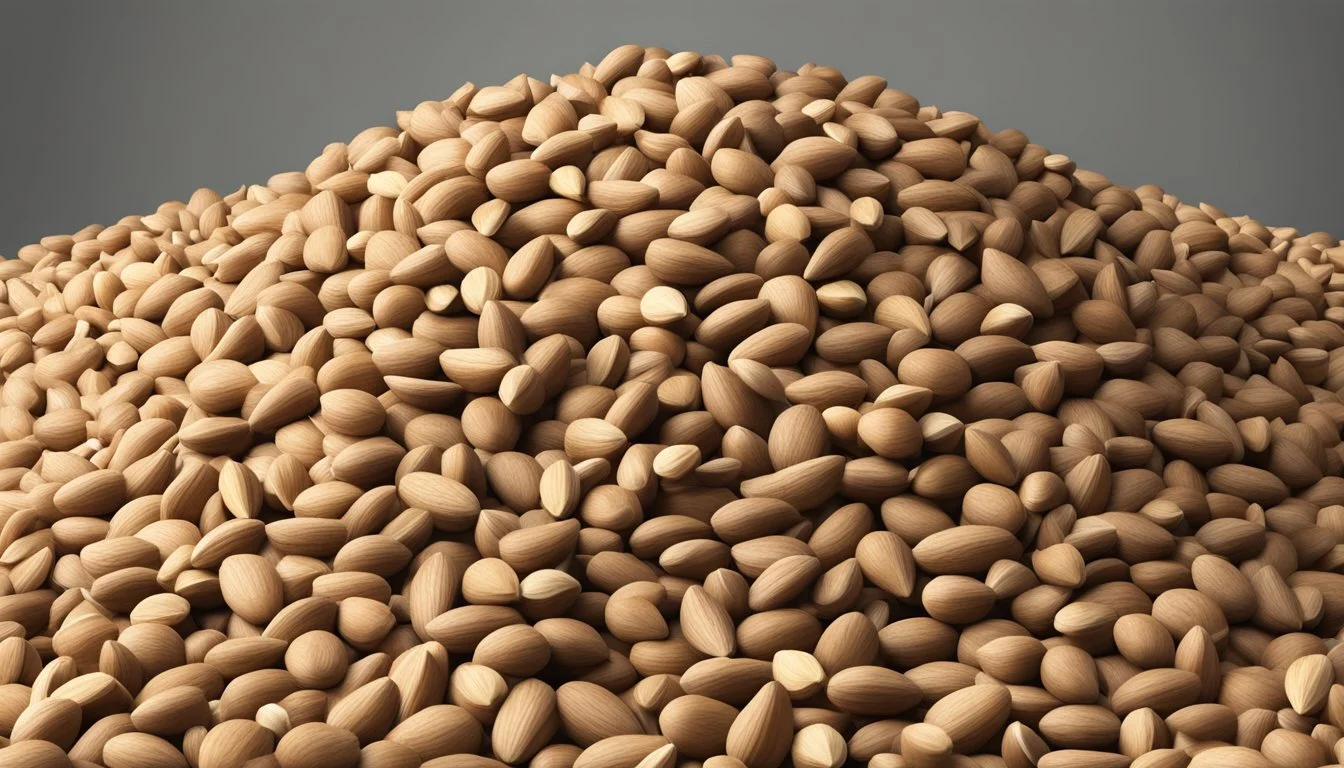How Many Bags of Planters Mixed Nuts Per Day Is Excessive?
Understanding Healthy Portion Sizes
Determining the appropriate amount of Planters mixed nuts one should consume daily hinges on various factors including individual dietary needs, health goals, and the nutritional content of the nuts themselves. Nuts (What wine goes well with nuts?) are widely recognized for their health benefits, such as being a good source of protein, healthy fats, fiber, vitamins, and minerals. However, like any food, they should be consumed in moderation. The standard recommendation for nut consumption by dietary guidelines is a daily serving of 30 grams, equivalent to a small handful. This serving size is sufficient to reap the benefits of nuts without contributing to excessive calorie intake.
Planters Mixed Nuts offer a versatile blend of peanuts, almonds, cashews, brazil nuts, hazelnuts, and pecans, each contributing its own distinctive nutritional profile. Regular consumption of mixed nuts can support heart health due to the presence of omega-3 fatty acids, fiber, and plant sterols, which can help reduce cholesterol levels and lower the risk of heart disease. It's essential to consider that mixed nuts can also be high in calories and sodium, especially when consumed in the form of salted or flavored varieties. Therefore, mindful consumption is key to maintaining a balanced and healthy diet.
Overindulgence in nuts, including Planters Mixed Nuts, can lead to an excessive intake of calories and potentially offset the health benefits. To avoid this, individuals should adhere to the recommended serving size and factor the caloric content into their daily caloric needs. Consuming more than the advised portion could contribute to unwanted weight gain if not balanced with physical activity or adjusted dietary intake elsewhere. Nutrition labels and serving sizes are crucial tools that can help individuals gauge their nut intake to ensure it aligns with their dietary objectives and health requirements.
Nutritional Profile of Mixed Nuts
Mixed nuts offer a robust nutritional profile, rich in beneficial fats, protein, and fiber, alongside an array of vitamins and minerals. They are a calorie-dense food, making portion control important. A typical serving size, which is about 1 ounce or 28 grams, varies slightly in nutritional content depending on the mix. Below is an overview of the nutritional composition of a standard serving of mixed nuts.
Caloric Content and Fat:
Calories: Approximately 160-170
Total Fat: 13-15g
Saturated Fat: About 2g
Unsaturated Fats (Mono- and Polyunsaturated Fat): Predominant fat type
Omega-3 Fatty Acids: Present, especially in walnuts
Proteins and Fibers:
Protein: Roughly 7g
Fiber: Generally 2-3g
Vitamins and Minerals: Mixed nuts are a good source of various vitamins and minerals, notably:
Vitamins: E and group B (varies by nut type)
Minerals: Magnesium, phosphorus, copper, manganese, and selenium
Nut Components:
Almonds and Hazelnuts: High in vitamin E and Calcium
Pistachios and Cashews: Rich in Potassium and Iron
Walnuts: Excellent source of Omega-3 fatty acids
Other Nutrients:
Cholesterol: 0mg
Sodium: Usually around 85mg or less if unsalted
Mixed nuts are a hearty inclusion to a balanced diet, with their fat content largely comprised of mono- and polyunsaturated fatty acids. These are the types of fats known to be heart-healthy. They also deliver a decent amount of plant-based protein, beneficial for muscle repair and growth. Due to their fiber content, mixed nuts can aid in digestion and promote satiety, which may assist in weight management. However, the high calorie density means moderation is key to avoid excessive calorie intake.
Health Benefits of Consuming Nuts
Nuts are lauded for their health benefits, which span from heart health to anti-inflammatory properties. They are a powerhouse of nutrients, containing a significant amount of unsaturated fats, which are beneficial types of fats that can lower the risk of heart disease. Unsaturated fats include omega-3 fatty acids, known to improve artery health by reducing inflammation and keeping blood vessels flexible.
Contained within nuts are antioxidants, which aid in protecting the body from oxidative damage that can lead to various diseases such as cancer and diabetes. Selenium, found in nuts like Brazil nuts, is an antioxidant that supports a healthy immune system.
Regular consumption of nuts can contribute to a decrease in bad cholesterol (LDL) and an overall lower cholesterol profile, which directly impacts heart health. This benefit is attributed to their fiber content and the presence of plant sterols, which are known to prevent the absorption of cholesterol in the intestine. Furthermore, the fiber in nuts also provides a feeling of fullness, which can aid in weight management by reducing overall calorie intake.
As for blood pressure, nuts contain minerals like magnesium that promote a healthy circulatory system. The benefits of consuming nuts are clear; however, it is important to monitor portion sizes to avoid excess calorie intake. Overall, when included as part of a balanced diet, nuts can provide numerous health advantages without excessive consumption.
Impact of Nuts on Weight Management
Nuts, including Planters mixed nuts, are nutrient-dense foods that offer a mix of unsaturated fats, protein, and fiber. These elements are crucial in discussions on weight management, particularly in relation to concerns about weight gain and the potential benefits they may have for weight loss and satiety.
Weight Gain and Obesity Concerns
Regular consumption of nuts has been erroneously associated with weight gain due to their high calorie and fat content. A 1-ounce serving of Planters mixed nuts contains approximately 170 calories, and excessive intake may contribute to an increased calorie surplus, potentially leading to weight gain. However, nuts should not be viewed singularly as a cause of obesity, but rather as a part of an overall dietary pattern.
Caloric Content: It’s important to consider the serving size. Moderation is key.
Nutrients: Despite their caloric density, nuts provide healthy fats that are essential for bodily functions.
Benefits for Weight Loss and Satiety
Despite their caloric density, nuts are associated with weight loss benefits when consumed in moderation.
Satiety: The protein and fiber in nuts can help reduce hunger and increase feelings of fullness, aiding in appetite control.
Nut Consumption: A moderate intake of nuts can be integrated into a weight loss diet. Studies suggest regular nut consumption does not lead to obesity and may even decrease the risk of weight gain.
It should be noted that replacing less healthy snacks with nuts can contribute positively to a weight management strategy.
Recommended Servings and Portion Sizes
Planters Mixed Nuts offer a hearty blend of nutritional benefits when included as part of a balanced diet. However, it is essential to adhere to recommended serving sizes to avoid excessive caloric intake.
A single serving of nuts, as prescribed by the United States Department of Agriculture (USDA), equates to one ounce. This typically translates to about:
1/4 cup or
A small handful or
Approximately 30 pieces of mixed nuts, depending on size and variety.
The nutritional profile for one ounce (28g) of Planters Mixed Nuts is as follows:
Nutrient Amount Percent Daily Value* Calories 170 kcal 10% Total Fat 15 g 24% Saturated Fat 2 g 12% Sodium 85 mg 4% Potassium 200 mg 4%
* Percent Daily Values are based on a 2,000 calorie diet.
Consumers should aim for no more than a couple of daily servings of nuts. A reasonable approach would be to include one serving in their diet, considering other sources of protein and fat they consume throughout the day.
For those monitoring their salt intake, selecting unsalted varieties of mixed nuts is advised, as salted versions can contribute to increased sodium levels. It is also wise to avoid consuming multiple servings in one sitting, as nuts are calorie-dense despite their nutritional value. Moderation is key.
By maintaining control of portion sizes, individuals can enjoy Planters Mixed Nuts as a nutritious, satisfying, and convenient snack without compromising their dietary goals.
Potential Risks and Side Effects
While Planters Mixed Nuts can be a nutritious snack, consuming them in excess harbors potential risks. It's important to be mindful of allergies, calorie content, and sodium levels as they can affect health.
Allergies and Intolerances
Individuals with nut allergies or intolerances should avoid Planters Mixed Nuts. Symptoms can range from mild (such as bloating or gas) to life-threatening anaphylaxis. It's critical for consumers with known allergies to carefully read product labels.
High Caloric Intake
A single serving of mixed nuts can contain substantial calories, primarily from fats. Though these fats are often healthy monounsaturated and polyunsaturated types, excessive consumption can lead to weight gain. Adults should limit intake to avoid exceeding their daily energy needs.
Weight Management: A handful (1 ounce) is a common serving size, equating to roughly 160-200 calories.
Nutrient Balance: Moderation ensures that calorie intake from nuts doesn't displace other vital nutrients.
Excessive Sodium and Blood Pressure Concerns
Salted varieties of Planters Mixed Nuts are high in sodium. High sodium intake can be problematic for individuals with or at risk of high blood pressure or stroke.
Recommended Limits: The American Heart Association suggests a limit of 2,300 milligrams a day, moving toward an ideal limit of 1,500 mg per day for most adults.
Inflammation Reduction: Unsweetened and unprocessed nuts can aid in reducing inflammation, whereas high sodium can negate these effects.
Varieties and Forms of Nuts
Planters offers a diverse range of mixed nuts, typically featuring a combination of peanuts, almonds, cashews, Brazil nuts, and pecans. Each type of nut contributes unique flavors and textures to the mix, whether consumed as a snack or sprinkled over a salad.
Nuts come in various forms: they may be raw or roasted, with roasting enhancing flavor and crunchiness. Unsalted nuts cater to those favoring natural tastes or watching their sodium intake, while salted varieties satisfy cravings for a savory snack.
Types of Nuts: Most mixes include peanuts (a legume), almonds, cashews, Brazil nuts, and pecans.
Nut Butter: Some prefer to consume nuts in the form of nut butter, a spreadable option made by grinding nuts, often with added oil and salt.
Calorie-Dense: Nuts are calorie-dense foods, requiring moderate consumption to maintain a balanced diet.
Seeds are sometimes mistaken for nuts but are a distinct group and can also be found in snack mixes. Their inclusion introduces a variety of nutrients and eating experiences.
In recognizing the variety, it is crucial to consider serving sizes. Excessive consumption of these calorie-dense foods may lead to an increased calorie intake, so moderation is advised to ensure a balanced diet.
Incorporating Nuts into a Balanced Diet
Nuts, such as those offered by Planters, are nutrient-dense foods that can play an important role in a balanced diet. They are rich in mono- and polyunsaturated fats — healthy fats that can support vascular health and may reduce heart disease risk. Including nuts as part of a daily diet aligns with the lifestyle principles suggested in the Mediterranean diet, which is praised for its heart-healthy approach.
A moderate amount, about a handful or one ounce, aligns with the USDA guidelines for nut consumption. This amount provides a good balance of total fat, protein, and essential micronutrients without exceeding daily caloric needs. Here are some brief facts about nuts in a diet:
Total Fat: Nuts contain a higher fat content, yet most of this is healthy fats like omega-3s that benefit heart health.
Nutritional Value: Nuts are a powerhouse of nutrients, contributing vitamins, minerals, protein, and fiber to one's dietary intake.
Micronutrients: They are a source of vital micronutrients such as vitamin E, magnesium, and zinc.
Omega-3s: Certain nuts, like walnuts, are especially high in omega-3 fatty acids, which are key for brain health.
To effectively integrate nuts into your diet, consider the following:
Snacking: A small, measured serving can make a satisfying and nutritious snack.
Meals: Add nuts to salads, yogurts, or whole-grain dishes to enrich their nutritional profile.
It is essential to watch portion sizes given the high calorie density of nuts. Planters Mixed Nuts should be enjoyed in moderation, and unsalted varieties are preferable for those monitoring sodium intake. By incorporating nuts sensibly into one's diet, they can contribute positively to overall nutritional health and lifestyle balance.
Research and Studies on Nut Consumption
Research into nut consumption has illuminated several health benefits related to regular intake. Studies have consistently shown that nuts possess anti-inflammatory properties. This is particularly relevant for conditions like cardiovascular disease (CVD), where inflammation plays a key role.
One study indicated that participants who consumed peanuts or tree nuts two or more times per week had a 15% to 23% lower risk of coronary heart disease (CHD) compared to those who rarely consumed nuts. Further examination reveals that walnuts, consumed once a week, were associated with a 21% lower risk of CHD.
In terms of metabolic diseases, evidence is varied regarding nuts' impact on diabetes incidence and mortality. However, consumption of nuts does not appear to significantly contribute to overweight and obesity, which are key risk factors for type 2 diabetes.
Beneficial Compounds in Nuts:
Omega-3 fatty acids
Fiber
Vitamin E
Plant sterols
The micronutrients and compounds within nuts may influence blood clotting, showing potential for reducing heart attack or stroke risk. Notably, nuts are recommended as part of the Mediterranean diet, renowned for its heart-healthy benefits.
It is important to consider that while nuts are nutrient-dense, they are also high in calories. Therefore, moderation is key, and a handful of nuts per day is typically advised.
In summary, research supports moderate nut consumption as part of a balanced diet but advises against excessive intake.
Practical Tips for Managing Nut Intake
When incorporating nuts into one's diet, it's essential to practice portion control given their calorie-dense nature. A standard serving of nuts is about 1 ounce, which equates to roughly 30 grams or a small handful. Given this, consuming multiple bags of Planters mixed nuts daily may easily exceed recommended portions.
For those focusing on a healthy lifestyle and managing conditions such as diabetes, nuts can be a beneficial addition due to their nutrient profile. However, akin to all foods, moderation is key.
Here’s how to manage nut intake appropriately:
Measure Servings: Use a kitchen scale or measuring cups to ensure accurate serving sizes.
Read Labels: Check for added sodium or sugars, especially in flavored or salted varieties.
Timing:
Snack Wisely: Opt for nuts during snack time rather than as an addition to full meals.
Spread Out Intake: Distribute nut consumption throughout the week to balance the diet.
Visual Aids:
A small container can serve as a guide for a single serving.
Comparing a serving size to common objects can aid in eyeballing portions without measuring tools.
Object Comparison Approximate Serving Size Golf ball 1 ounce of nuts Small cupped hand 30 grams of nuts
Listen to Your Body: Recognize satiety cues to avoid overeating.
By adhering to these guidelines, individuals can enjoy the health benefits of nuts without overindulging. Remember to account for individual dietary needs when determining the appropriate quantity of nuts to consume.
Beyond the Diet: Other Considerations
When assessing the impact of consuming Planters mixed nuts, it's crucial to move beyond just the dietary aspects. A closer look at environmental factors, ethical sourcing, and the potential for culinary exploration can offer a more holistic understanding of nut consumption.
Environmental and Ethical Factors
The production and consumption of mixed nuts touch on significant environmental and ethical issues. For the conscious consumer, it's important to consider the ecological footprint of nut farming, which can include water usage, land management, and the energy required for processing and transportation. Ethically sourced nuts are becoming more sought after, ensuring fair labor practices and sustainable farming techniques. When consuming nuts as snacks or dietary supplements for their healthy fats and energy-boosting properties, choosing brands that prioritize these factors aligns with a responsible lifestyle.
Water Usage: Certain nuts, like almonds, require substantial water to grow.
Ethical Sourcing: Fair Trade certification can indicate ethical practices.
Biodiversity: Sourcing nuts from farms that promote biodiversity can help conserve the environment.
Culinary Uses and Recipes
Beyond their status as a convenient, healthy snack, Planters mixed nuts can be creatively incorporated into various recipes, adding flavor, texture, and nutritional value. For individuals who enjoy cooking, integrating nuts into meals can enhance their culinary experience while maintaining a balanced diet. Nuts can be added to salads for extra crunch, crushed as a topping for baked goods, or even blended into sauces to enrich the dish with healthy fats. Providing lasting energy, nuts make excellent additions to breakfast items, such as oatmeal or yogurt, ensuring one starts their day on the right foot. From a culinary perspective, nuts can transform a simple dish into a more sophisticated and nutrient-dense meal.
Recipe Ideas:
Salads: Toss in a handful of mixed nuts for a satisfying crunch.
Baked Goods: Use crushed nuts as a healthy topping on muffins or bread.
Sauces: Blend nuts into pesto or creamy sauces for added depth.
Whether one's lifestyle includes daily walks or maintenance tasks that require strong nails and energy, considering these additional factors related to nut consumption can contribute to overall well-being and a more informed approach to one's dietary choices.
Conclusion
Moderation is key when it comes to nut consumption. Health experts typically recommend a daily serving size of nuts that aligns with one's energy requirements and dietary needs. For general guidance, a handful or approximately one ounce (around 28 grams) is often cited as an ideal portion size, which may consist of:
18 medium cashews
24 almonds
Planters Mixed Nuts are certainly a nutritious snack choice, laden with essential nutrients such as proteins, monounsaturated and polyunsaturated fats, fiber, vitamins, and minerals. These components are beneficial for heart health and maintaining adequate nutrient intake.
However, individuals should be cautious of the potential high sodium content in salted varieties and the caloric density of nuts, which can contribute to unintended weight gain if not portioned correctly. For individuals managing specific health conditions or dietary restrictions, tailored recommendations should be sought from a healthcare provider or a registered dietitian.
In conclusion, while Planters Mixed Nuts can be a healthy addition to one's diet, they should be consumed in controlled amounts. Monitoring daily servings, limiting intake of salted options, and incorporating them into a balanced diet are prudent practices to maximize their health benefits without overindulgence.













